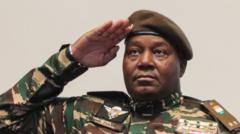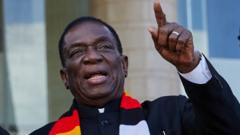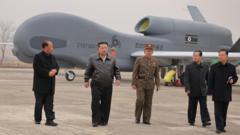The recent swearing-in brings with it a promise to address security issues and a shift towards military governance, raising flags over personal freedoms and international relations.
**Niger's Military Leader Assumes Presidential Role Amid Controversy**

**Niger's Military Leader Assumes Presidential Role Amid Controversy**
Niger's transitional government enters a new phase as coup leader Gen Abdourahamane Tchiani is inaugurated president for a five-year term.
Niger's military ruler, General Abdourahamane Tchiani, was officially inaugurated as the president for a five-year transitional period following his leadership role in a coup two years ago that ousted elected President Mohamed Bazoum. The ceremony took place in the capital, Niamey, under a newly established charter that replaces the existing constitution. This charter grants General Tchiani the position of the highest military rank in the country and includes a decree to dissolve all political parties.
In his address, Tchiani expressed humility in receiving his new military honors, pledging to uphold the trust bestowed upon him. The transitional government aims to navigate a complex path towards democratic rule, contingent upon the country's turbulent security situation, as Niger faces ongoing jihadist threats that were significant factors in the coup.
The power shift in Niger aligns with a broader trend of military governance across West Africa, echoing similar situations in neighboring Mali, Guinea, and Burkina Faso, all of which have severed traditional ties with former colonial power France and are developing new connections with Russia. Notably, Niger’s relationship with the Economic Community of West African States (ECOWAS) deteriorated after the junta's initial proposal for a three-year return to civilian rule was deemed provocative, leading to threats of military intervention that were ultimately rescinded.
Additionally, the Tchiani administration has launched a case against former President Bazoum, who remains detained under accusations of high treason. Despite this tension, the military ruler asserts the new charter's alignment with customary legal practices while claiming it contains innovative strategies to ensure that Niger's natural resources directly benefit its citizens.
As Niger navigates this critical juncture, the future remains uncertain, with the potential for ongoing civil unrest and international scrutiny looming. Discussions about the implications of military governance in the region are expected to continue, as cities across Niger and beyond await the outcome of this precarious transition.
In his address, Tchiani expressed humility in receiving his new military honors, pledging to uphold the trust bestowed upon him. The transitional government aims to navigate a complex path towards democratic rule, contingent upon the country's turbulent security situation, as Niger faces ongoing jihadist threats that were significant factors in the coup.
The power shift in Niger aligns with a broader trend of military governance across West Africa, echoing similar situations in neighboring Mali, Guinea, and Burkina Faso, all of which have severed traditional ties with former colonial power France and are developing new connections with Russia. Notably, Niger’s relationship with the Economic Community of West African States (ECOWAS) deteriorated after the junta's initial proposal for a three-year return to civilian rule was deemed provocative, leading to threats of military intervention that were ultimately rescinded.
Additionally, the Tchiani administration has launched a case against former President Bazoum, who remains detained under accusations of high treason. Despite this tension, the military ruler asserts the new charter's alignment with customary legal practices while claiming it contains innovative strategies to ensure that Niger's natural resources directly benefit its citizens.
As Niger navigates this critical juncture, the future remains uncertain, with the potential for ongoing civil unrest and international scrutiny looming. Discussions about the implications of military governance in the region are expected to continue, as cities across Niger and beyond await the outcome of this precarious transition.





















